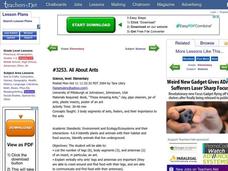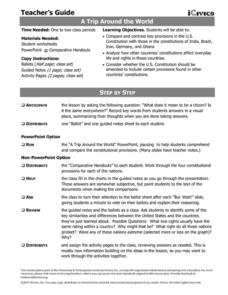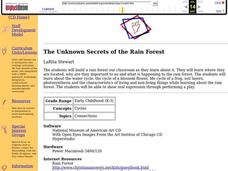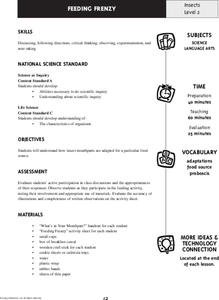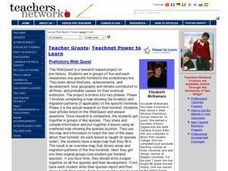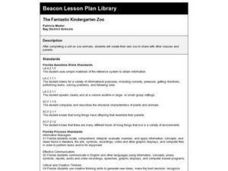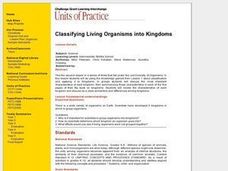Curated OER
Parent and Baby Lookalikes
Students research baby animals, their special names and the vocabulary to describe their relative sizes through discussion, listening to a Salish story, looking at pictures, and creative artwork . They will also explore the significance...
Curated OER
An Automobile Phylogenetic Tree
Learners study a list of cars and trucks and think about characteristics that can be used to show an "evolutionary relationship". From the characteristics they identity, students construct a phylogenetic tree to show how the automotive...
Curated OER
Rock-a-bye Babies in a Wetland
Students review the way human babies grow and what type of care they need. Using the internet, they are introduced to five different wetland habitat animals and how their babies grow. They discover how they are born and what the...
Curated OER
Tree Lesson
Students compare and contrast characteristics of conifer and hardwood trees. After collecting samples of branches around the school, they classify the branch as hardwood or conifer. Groups of students identify given twigs. They go...
Curated OER
Native Plants: An Outdoor Scavenger Hunt
Students recognize various California native species by their physical appearances and characteristics. They recognize the adaptations that plants make to their surroundings and how humans make use of plants.
Curated OER
Habitats of the World
Students complete a unit of eighteen lessons that cover climate, geography, location, plants, and animals of each of the five habitats. They are also introduced to habitat destruction and discuss ways to protect the environment. They do...
Curated OER
All About Ants
Students create model ants in order to study the characteristics of insects such as body segments, number of legs, and feelers, as well as how these characteristics serve the insect.
Curated OER
Are Chickens Really "Chicken"?
Students practice their reading comprehension skills by reading about chickens. They state the characteristics of chickens and examine how growing up on a farm and being in the wild is different for the chickens.
Curated OER
Treetures
Young scholars identify the different forests of the world and some of the characteristics that differentiate them. They explore old magazines, calendars and photos and fill out a scavenger hunt worksheet.
Curated OER
Citizens For the New Zoo
Third graders complete Internet research to find information about an animal and its basic needs. They design a model of a zoo habitat that would accommodate their animal. They write a letter of recommendation to a Zoo board of directors...
Curated OER
A Trip Around the World
Students role play the role of a travel agent. In groups, they must plan a trip around the world making stops in a different biome. They use the internet to discover the characteristics of each biome and create a travel brochure for...
Curated OER
The Unknown Secrets of the Rain Forest
Students listen to the story "The Great Kapok" then discuss characteristics of the rain forest. They make several different types of rain forest animals from paper plates (ex. sloth, tigers, monkeys etc) and design costumes for a...
Alabama Learning Exchange
Is That a Whale?
Pupils research the characteristics and examples of the two main types of whales. They work in groups to study the habitats of each type of whale before developing a slideshow presentation of the information.
Curated OER
Feeding Frenzy
Students examine, through experimentation and simulation, how insect mouthparts are adapted for particular food sources, discuss how various animals have adapted to survive, play Feeding Frenzy game, and complete activity sheets.
Curated OER
Coqui Frog Camouflage
Learners investigate the concept of the coqui frog of Puerto Rico. They conduct research using a variety of resources. Students explain in oral or written form some of the characteristics to that identify the frog. The lesson includes...
Curated OER
Classified Information - Part 1: Shapes
Third graders investigate how and why scientists use classification. They discuss classification strategies using animals, and as a class fill in a flowchart with their responses. Next, in small groups they cut out a variety of shapes...
Curated OER
Prehistory Web Quest
Sixth graders identify how geography and climate determine the lives of early hominids, the characteristics of hunter-gatherer societies, how animals affected the lives of early hominids, and how hominids overcame their physical...
Curated OER
Arthropods
In this arthropods worksheet, students will review the 4 characteristics of arthropods and then use a lobster diagram to complete 2 short answer and 1 true or false question.
Curated OER
What Can a Leaf Be?
Students identify leaves for an art project and create a collage. In this leaf lesson, students review leaf characteristics. Students use leaves to create a collage of an animal or creature. Students write recipes of leaves for their...
Curated OER
Engineering and the Senses: Smell
Students define the sense of smell. In this smell sense lesson, students review their five senses and define the importance of smell. Students practice smelling and identifying items in bags. Students discuss the importance of smell to...
Curated OER
Sort Laboratory Practice
Eighth graders sort animals according to certain physical characteristics. In this science lesson, 8th graders explain the reason for such classification. They complete a worksheet individually at the end of the lesson.
Curated OER
The Fantastic Kindergarten Zoo
First graders create their own zoo to share with other classes and parents. Groups create displays for the animals. Have each group brainstorm how they create a display for their animal.
Curated OER
BIRDS OF A FEATHER
Students observe and identify characteristics of artifacts and fossils; explain how artifacts and fossils are used to explore the past; and identify ways that Native Americans prepared food and made tools
Curated OER
Classifying Living Organisms into Kingdoms
Pupils create a flip book that describes the basic characteristics of the five main animal kingdoms. They research the animal kingdoms, include examples of organisms for each kingdom and illustrate the finished text.








